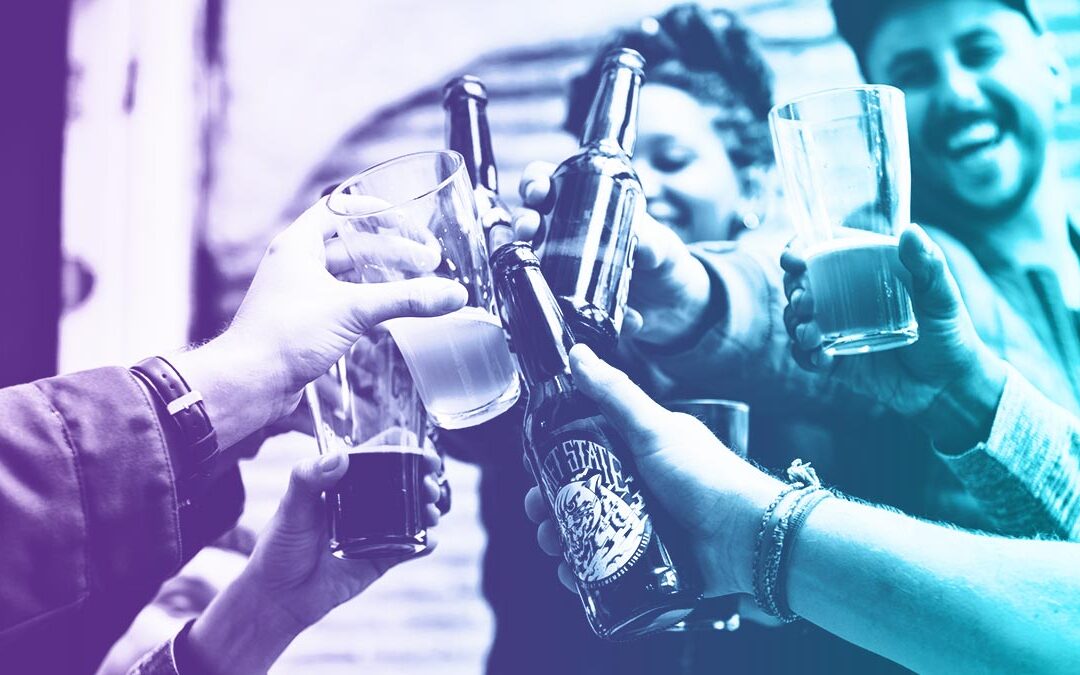Alcohol Poisoning
Did you know that in 2019, Monroe County here in Florida had the highest percentage of people who reported binge drinking within the past year? In Florida, 18% of adults report heavy drinking during the year. That’s almost 4 million people. In the United States alone, over 52 million ER visits in 2020 were because of alcohol use. Alcohol poisoning can be one of those reasons and usually stems from binge drinking. So what do you need to know about alcohol poisoning?

Florida is a very popular tourist destination. It’s a staple for spring breaks and college students, which can lead to lots of drinking. Having a decent understanding of what alcohol poisoning is, how to spot it, and even how to prevent it can help inform others on decisions about their health when they need it most. Here at Clean Recovery Centers, we believe in helping people during every step of their recovery, even before they’re at our doors. Preventing alcohol use disorder is a wonderful step for helping better the lives of those in our community. Let’s dive in and learn more about alcohol poisoning.
What is Alcohol Poisoning?
Alcohol poisoning occurs when you have more alcohol within your body than your liver is able to properly process. When your liver is busy but you keep consuming alcohol, it doesn’t just go away or wait its turn. It’s still in the bloodstream and can start to impact your brain, which affects your breathing, heart rate, and more. This can cause your body to start shutting down.
Signs and Symptoms of Someone Experiencing Alcohol Poisoning
Knowing is half the battle when it comes to most things in life, and this doesn’t exclude substance use and health. If you know what the signs of alcohol poisoning are, you might be able to spot it in yourself or a loved one and help get medical care in order to save a life.
If you start noticing any of these symptoms, don’t assume they’ll just “get over it.” You should not “sleep off” alcohol poisoning, as you could face long-lasting brain damage or even death because of some of the side effects. Here are the signs you can look out for that indicate alcohol poisoning.
- Stupor or confusion
- Having trouble remaining conscious
- Vomiting
- Seizures
- Slow or irregular breathing
- Clammy skin
- Slowed heart rate
- Dulled response to stimuli, including gag reflex
- Low body temperature or blue-tinted skin
Helping Someone with Alcohol Poisoning
Now you know the signs, but what do you do if someone is experiencing alcohol poisoning? How should you respond?
Medical professionals can best assist someone with alcohol poisoning, but they can’t get there immediately, so what do you do in the meantime?
What You Should Do
Once you recognize the signs of alcohol poisoning, immediately dial 911. If you can, try to figure out exactly what the person drank in order to best help medical professionals when they arrive. If they took other substances besides alcohol, be honest about that as well so they can give your friend or loved one the best medical care possible.
If a person starts vomiting while you’re waiting for medical help to arrive, help make sure they can do so safely. This means making sure they don’t choke on it as their gag reflex will be little to none due to the high level of alcohol in their bloodstream. If the person is lying down, roll them onto their side so gravity can help.
If the person has a seizure, make sure you time the seizure. Let the medical team know about it and how long it lasted. You can also help clear the area while they’re having a seizure to help ensure they don’t hurt themselves. Place a flat object like a folded jacket under their head to give it some cushion and reduce the chance of injury.
What You Shouldn’t Do
Don’t wait until symptoms worsen to call for help. The longer someone is going through alcohol poisoning, the higher their chances of facing long-term damage to their body and brain.
Don’t leave them alone while help is arriving. If they’re not unconscious already, they face the risk of injury if they do suddenly pass out. In addition, a person who is unconscious because of alcohol poisoning shouldn’t be left unsupervised. They could start having a seizure or choking on their own vomit.
There isn’t a way to reverse alcohol poisoning at home. Don’t try to give them a cold shower or take them on a walk, neither of these will benefit them and they could lead to potential injury. In addition, if a person starts having a seizure, make sure you do not hold them down in any way.
How Common Is Alcohol Poisoning?
On average, 6 people die each day because of alcohol poisoning. This adds up to around 2,200 deaths each year in the United States. Over 75% of these people are men and are aged 35-64. Alcohol poisoning deaths are preventable if you are able to call for help.
Can You Prevent Alcohol Poisoning?
The obvious way to prevent alcohol poisoning is by not drinking, but if you are drinking what can you do to help ensure you don’t overdo it?
One of the biggest risks of alcohol poisoning is having other substances in your body. Not only can other substances alter your perception of how intoxicated you are, but they can also add to the number of things your liver has to process. It’s easier to overdose on substances when you’re partaking in more than one at a time.
Another important tip is moderation. Even if you get drunk, you don’t have to overdose on alcohol. Avoiding binge drinking can help you avoid alcohol poisoning. Binge drinking is classified as drinking more than 5 drinks within a few hours. One “drink” is either 12 ounces of beer, 5 ounces of wine, or 1.5 ounces of other spirits and liquors. When you binge drink your blood alcohol content (BAC) rises faster. The higher your BAC is, the more likely you are to experience alcohol poisoning.
Alcohol Treatment at Clean Recovery Centers
While not everyone who experiences alcohol poisoning is managing an alcohol use disorder, it can be a part of the stages of alcoholism, which could lead to a person wanting to consider their recovery options. Clean Recovery Centers offers a variety of alcohol treatment programs for those looking to start their path of recovery from alcohol use disorder. We offer everything from detox to inpatient and outpatient services to help ensure you meet your healing goals.
If you have any questions about our treatment centers or programs, feel free to give us a call today at (888) 330-2532.
FAQs About Alcohol Poisoning
At what level does alcohol poisoning occur?
If your BAC is above .25%, you’re likely to experience alcohol poisoning. This doesn’t mean levels below .25 are still safe, however.
What happens to your body when you have alcohol poisoning?
Due to your body being overwhelmed by the amount of alcohol within your bloodstream, it will start to shut down. Many fall unconscious. While unconscious you could vomit, which leads many to choke on their own vomit. You also could experience seizures.
Sources:
- https://www.flhealthcharts.gov/ChartsReports/rdPage.aspx?rdReport=BrfssCounty.DataViewer&bid=10
- https://www.sciencedirect.com/science/article/pii/S2772724622000270
- https://www.cdc.gov/vitalsigns/alcohol-poisoning-deaths/index.html


